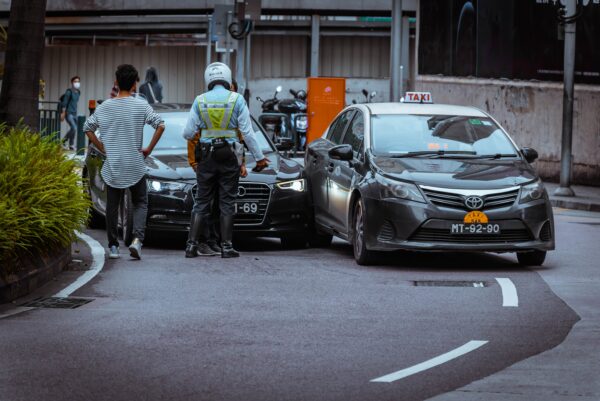What to do in a Car Accident

There were hundreds of car accidents in North Carolina last year. Many of those accidents were caused by the negligence or lack of ordinary care by one or both of the drivers. If you are involved in a car accident, what should you do?
First, prepare for a car accident before it happens. Keep your car well-maintained for your safety as well as the other drivers on the roads of North Carolina. Wear your seatbelt and obey the traffic laws. Be sure you have current insurance for your car. Keep flashlights and flares in your car in the event of a nighttime accident. Keep a notepad and pencil to take notes and witness information. Keep a disposable camera in your glove compartment. That way, if and when you get in a car accident, you can immediately document the scene, including any skid marks, and the damage to all the vehicles.
When you get in a car accident, do not leave the scene. North Carolina law requires that the driver of a vehicle involved in an accident resulting in personal injury, property damage or death stop his vehicle at the scene of the accident. You also have a duty under the law to render reasonable assistance to any injured person. Even if you are unknowledgeable about first aid or emergency assistance, you can call 911 and request medical help. If you do render emergency medical treatment, you are protected from any civil lawsuit for such help unless you recklessly or intentional cause further damage. Even if there is no personal injury, if the accident involves more than $1000 in damage to the vehicles, the police must be called. When the officer arrives, he will investigate the scene, interview the parties and witnesses, and may issue citations for one or both drivers. This report will be available for anyone form the N.C. Division of Motor Vehicles in Raleigh. If the accident was investigated by the Wilmington Police Department, the report can be viewed and downloaded online at http://p2c.wilmingtonnc.gov/main.aspx. This report may assist you or your attorney later if you make a claim or a claim is made against you.
The scene of an accident is a dangerous place. Keep well back from the road and avoid standing between two cars. You may want to have someone stationed to warn approaching traffic. At night, use flares and flashlights. If there are no obvious personal injuries, and the car can be driven normally, move the vehicles off the road. Cooperate with the investigating officer by giving him the facts of the accident. You do not however have to give an opinion as to the cause of the wreck. Especially if it is a serious wreck, you should consult an attorney before giving a statement of opinion. Do not admit you were at fault or make any payment or promise of payment. You may find out later that you were in fact not at fault and the other driver was to blame. If the facts reveal that you were clearly at fault, there will be ample time to admit that you were to blame. Do not leave the scene of the accident until the investigating officer gives you leave to go. You should also have obtained the contact information from the other party as well as any witnesses to the accident.
After you leave the scene, unless you are in a very minor accident, you should see a doctor or other health professional. Many times the simple shock of the accident can mask injuries. Do not exaggerate your injuries, but neither should you ignore them and try to “tough it out.” You should also take pictures of your injuries such as bruising or scarring to preserve this evidence.
Notify your insurance company of the accident. If there is a claim brought against you, they will provide you with legal representation. If you fail to notify them of the accident or of any legal claims that are brought against you, they may deny coverage later for your failure to cooperate.
Speak with an attorney. There are many attorneys in this area who do an excellent job in representing people injured in a car accident. These lawyers have the experience in preserving and developing evidence for a claim from a car accident. They can also advise you on how to handle a traffic citation that you may have received from the accident. A traffic citation at the scene does not necessarily mean the person receiving the citation is at fault, however, how the citation is resolved in the criminal court may be useable as evidence in the civil court.